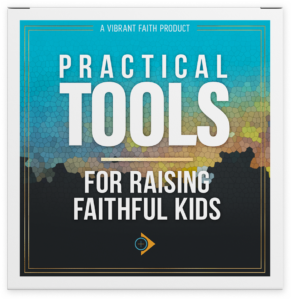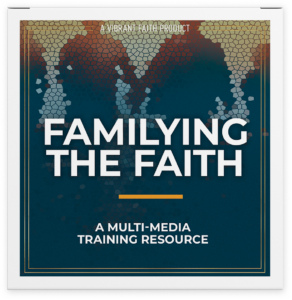
What We’re Learning: Entering Into the Brokenness

In 1997, Lutheran pastor Dr. Merton Strommen and his wife Irene founded The Youth & Family Institute in memory of their son David, a young seminarian and youth worker who was killed by lightning while leading a youth trip in the Colorado mountains. The name of the Institute was changed to Vibrant Faith in 2010.
Dr. Strommen was among the first church leaders researching the faith life of adolescents. Through that work he discovered the importance of “familying” relationships for faith development. In short, this means that parents (and people who are like parents) hold the greatest influence in the faith formation of young people. Mert’s vision was to take the best research and academic insights, ground and deepen them with Christian theology, then instill an evangelical spirit of ministry to help congregations strengthen families to nurture faith.
But recognize this… The Strommens birthed this organization out of their own family tragedy. They created a “living organizational legacy” intending to bring hope and faith to life by re-focusing the church on familying relationships.
Why does all this matter 27 years later?
Is the Strommens’ Vision an Impossible Dream?
Those of us who are currently tending the Strommens’ vision for the power of family life in the faith-life of the next generation are very aware that much of the U.S. Christian church believes the Strommens’ dream is nice, but unachievable. In effect, the church agrees with the foundation of Strommen’s research—re-asserted by many other studies, including Dr. Christian Smith in his book Handing Down the Faith—but treats it as impractical. Three decades later many in the church act as though families are structurally LESS capable of passing on Christian faith from generation to generation. It stands to reason, then, that the only hope young people have for embracing and growing in lifelong relationship with Jesus rests with the ministries and programs of the church.
Yes, families ARE broken:
- High divorce rates and low marriage rates have created more forms of families, including single-parent and step-families.
- Family life is busier than ever with two parents working as the new norm, often out of financial necessity.
- Many extended families are cut off from one another—whether geographically or emotionally or both.
- We are just beginning to recognize the impact of traumatic family life on the nervous systems of both parents and children. These origin experiences profoundly affect people’s capacity to receive God’s love and enter into an ongoing life of faith.
Entering Into Broken Family Lives
As Vibrant Faith continues our Fourth-Soil Parenting Project work, we’ve encouraged church leaders to help parents engage the sin and brokenness that they carry with them into raising children. This has been very difficult challenge for our churches to take on. Programs and worship services aren’t well-suited for inviting people to acknowledge, name, and describe the messiness they bring into their parenting.
We seem to have forgotten that it is IN the messy and broken—for example, the grief the Strommens’ experienced so deeply—that God is most present. Only by engaging in what is messy and broken can we actually help parents and children develop real connections with their story and God’s story, opening conduits for healing and new life.
Why should the Christian church lean on the broken, sinful institution of the family as primary evangelizers of the next generation?
- Because families have always been broken, from Cain and Abel until today.
- Because God has decided and reiterated His organic strategy for passing on the faith, and that strategy focuses on parents and people who are like parents.
- Because broken vessels point us to the healing power of a Savior.
- Because this work has never been about happy families—it’s about what God does IN SPITE OF the messiness of family life.
From its inception, Vibrant Faith has been working to plant and nurture redemptive habits of God-dependence in families, through the influence of the church and planted in the soil of grief and sorrow. Join us!
Make this the year that you and your church partners lean into FAMILYING the Faith. When you consider how to engage your parents, our strategies need to land comfortably in their everyday rhythms. They need spiritual prompting that fits their relational ecosystem. And they need Scriptural connections that are the MOST meaningful and resonant for them in the moment. We describe this as FAMILYING the Faith. It’s also the name of our new podcast—check it out HERE.

Dr. Nancy Going serves as the Director of Research & Resource Development for Vibrant Faith. Nancy lives in Nashville, Tennessee with her husband Art, an Anglican priest, and they have launched two new families from their children.
[activecampaign form=5]
If you liked this article, check out the following resources that help parents become the primary influencers of their children’s faith: 

Practical Tools for Raising Faithful Kids Familying the Faith.
